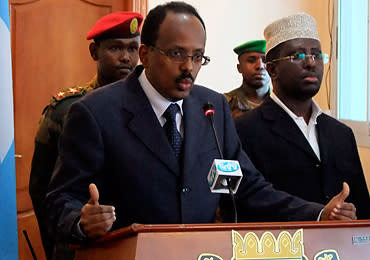 The Envoy
The EnvoyBuffalo transportation worker returns to job after heady tour as Somali prime minister

New York State transportation worker Mohamed A. Mohamed has recently returned from a sabbatical that's fairly unprecedented in the annals of civil-service leave-takings. Between last October and this June, he was the prime minister of Somalia—and now, after being forced out and appointing his successor, he's back at his old workstation at the Buffalo office of the Department of Transportation.
It all began with a trip to the United Nations last October, as Buffalo News reporter Jason Rey recounts in an arresting summary of Mohamed's odyssey. Mohamed met with Somali President Sheikh Sharif Sheikh Ahmed to discuss conditions in Somalia, where Mohamed emigrated from more than two decades ago. Impressed by Mohamed's concern, the president offered the civil servant the prime minister's post on the spot.
After living more than a quarter-century away from his troubled homeland, Mohamed found his return as a head of state a rude awakening on several levels. "After his first interview with Somalia's president, he stepped outside and a bullet whizzed passed, landing two feet in front of him," Rey writes. " 'Yeah, that's normal,' said the man walking with him. 'Keep walking.' "
It was, in many ways, a fitting introduction to the severe challenges facing anyone trying to restore order and peace to a nation ravaged by civil war, famine, militant Islamist terrorism and piracy. Some 11.5 million Somalis are suffering from the present famine, and the political chaos in the country has only compounded the suffering. As Sarah Margon, a former U.S. Senate Africa specialist now working at the liberal Center for American Progress, told The Envoy, "What you're looking at is a perfect storm: a humanitarian disaster compounded by political complexities, conflict and insecurity throughout the region." International aid groups that "don't have viable partners in Eritrea, Somalia and parts of Ethiopia are under serious risk," she added. "And the Ethiopian regime is becoming increasingly [autocratic]. The combination of all these sectors make a natural disaster response doubly difficult."
The terrorist threat in the nation has further complicated aid efforts. The southern part of Somalia has fallen under the control of the Islamist group al-Shabaab, which has ties to al-Qaeda. Until recently, the United States had imposed restrictions on humanitarian groups delivering aid to southern Somalia, on the grounds that such material would likely be intercepted by al-Shabaab. "Our number-one priority is to save lives," a USAID official with the united States Agency for International Development said on a call with reporters last week to announce the policy shift. "What we are mainly concerned about is creating the flexibility in all possible ways so that assistance can be provided."
Mohamed's challenges on the job were more immediate. "When I went there," he told Rey, "I thought there was a functioning system that only needed some adjustment here and there. But honestly," he said, "everywhere was dysfunction. You're starting from scratch."
He was forced out of his post in June, when the president and the Somali parliament, long at odds over basic provision of security and services to Somali citizens, struck an accord to preserve the incoming flow of global aid support. Part of the agreement was Mohamed's ouster. And even Mohamed's departure was a moment of great danger and uncertainty: After word leaked that he might be on his way out, a crowd of his supporters gathered in Mogadishu to protest--but after Mohamed's interior minister successfully dispersed the crowd over fears of a potential terrorist attack, a suicide bomber killed the minister in his home. It was later revealed that the bomber had been the minister's niece.
As a condition of his departure, Mohamed was able to name his successor: another upstate New York Somali exile named Abdiweli M. Ali, an economics professor at Niagara University. Mohamed told Rey that he now plans to launch a nonprofit group to unite Somali immigrants in the United States—and that while he won't speculate about a future run for the Somali presidency, he may in fact run for office in America. In the meantime, his fellow workers at the Department of Transportation welcomed him back from his extraordinary sojourn with a standard office-worker tribute: a ceremonial cake.
